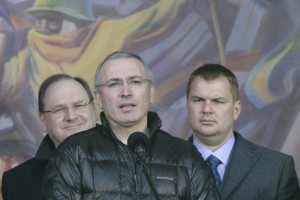Khodorkovsky’s op-ed for Esquire
 In its 10-year anniversary issue, Russian Esquire published an op-ed by Mikhail Khodorkovsky, in which he looks back and reflects on the year 2014, his first year as a free man. Read the full op-ed in Russian here.
In its 10-year anniversary issue, Russian Esquire published an op-ed by Mikhail Khodorkovsky, in which he looks back and reflects on the year 2014, his first year as a free man. Read the full op-ed in Russian here.
Imprisoned for 10 years, Khodorkovsky reveals that he would never have thought how one year could bring as many points of no return as Russia has experienced.
Remembering the 2014 Winter Olympics in Sochi as a portrayal of how European an open Russia could look and act, Khodorkovsky says that victories claimed by Russian athletes made him proud of the country. However, this “colourful ray of hope” was swiftly overshadowed by the events in neighbouring Ukraine.
He stresses how persistent the Euromaidan participants were in defending their rights despite the violent suppressions carried out by Viktor Yanukovich’s corrupt regime; a regime supported by the Russian government of President Putin. Khodorkovsky’s subsequent conversations with protestors and riot police lying in Kiev hospitals reassured him that not only the Kiev government participants but also the Kremlin’s advisers were to blame for the deaths of hundreds of people.
Khodorkovsky believes that the subsequent absence of a strong governmental power in Ukraine allowed Putin to solve the problem of his falling popularity ratings by sending Russian troops to imitate “Crimea militia”. Himself understanding the patterns of the Kremlin’s provocative strategy, Khodorkovsky was yet astonished by the Russian media coverage of the MH17 tragedy that brought state propaganda to an absurd level.
Commenting on the rouble devaluation in early winter, Khodorkovsky says that the international distrust of the country and rejection of the West to cooperate with aggressive unpredictable Russia were the real reasons behind the deterioration of the economic situation in the country after the annexation of Crimea.
Khodorkovsky concludes that although the Navalny brothers’ verdict left no room for optimism in his first year after release, he still believes that freedom is the most fundamental value for which one can fight, for a lifetime.



